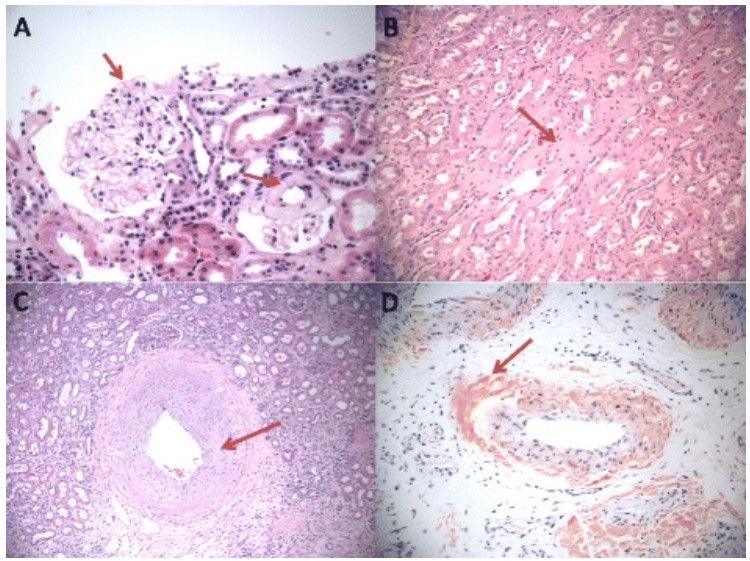Playlist
Show Playlist
Hide Playlist
Nephrotic Syndrome: Complications and Treatment
-
Slides Nephrotic Syndromes.pdf
-
Download Lecture Overview
00:01 Okay, so we've talked about nephrotic syndrome and what characterizes it. 00:05 Let's talk about some of the complications from actually having nephrotic syndrome. 00:09 One of the biggest things that we worry about in our patient population is patients having altered coagulation. 00:15 So our patients are predisposed to getting thromboembolism that means that they can manifest with DVT'd and PE's. 00:21 It's typically seen, when people have high grade proteinuria so greater than 10 grams of proteinuria. 00:28 Our patients have an increase in hepatic production of pro coagulation factors and at the same time, we just talked about how they have those clotting Inhibitors that they're getting lost through that glomerular capillary wall. 00:39 So they lose these anticoagulant factors. 00:42 And then concomitant volume depletion oftentimes that's iatrogenic from us giving our patients diuretic therapy that reduced oncotic pressure that they already have from that hypoalbuminemia in their vessels leads to hemo concentration and increased platelet aggregation. 00:56 So you finally end up with thrombus formation. 01:00 Sometimes there's a predilection for renal vein thrombosis probably because of loss of fluid across the glomerulus and the ensuing hemoconcentration in the post glomerular circulation. 01:09 That's not uncommon to have that scenario where a patient presents with back pain renal vein thrombosis and then something like membranous nephropathy. 01:19 So another complication of having a nephrotic syndrome is infection and increased risk of developing infections and this is again, because not only are we losing albumin. 01:29 We're losing immunoglobulins through the urine as well. 01:31 Remember that glomerular capillary wall is breached so we can lose immunoglobulins and when that happens people can be predisposed to things like staphylococcus or strep which are most common. 01:44 Okay, so when it comes to a patient sitting before you and they have nephrotic syndrome regardless of the cause there's a couple of things that we have in our armamentarium in order to treat our patients. 01:55 One of the most important things is using medications like ACE inhibitors or angiotensin receptor blockers. 02:02 These are agents that are going to antagonize the RAAS system, that's the renin-angio-aldo-system. 02:07 And that's incredibly important because that is going to reduce that intro glomerular capillary pressure and reduce proteinuria and that's exactly what we want to do in this patient population. 02:17 We also want to give our patient loop diuretics. 02:20 These are things like furosemide, bumetanide, because that's very helpful to mobilize volume off their body. 02:26 Remember our patients are very edematous. 02:28 They're retaining salt the retaining water. 02:31 So it's in it's very important to be able to mobilize that and a loop diuretic is a perfect way to do that. 02:36 We cannot do that alone however, our patients have to be cognizant to have a low-sodium diet. 02:42 It's critical for them to actually intake less than two grams per day. 02:46 Again, this is a perfect opportunity for me to have my nutritionist or dietitian come in and speak with my patient to really help them in making healthy food choices and understand what a low sodium diet is because none of what I just talked about is going to work unless they use a low sodium diet. 03:03 I also want strict blood pressure control in these patients a blood pressure of less than 130/80 is going to be helpful again and reducing proteinuria and helping to slow this disease process. 03:13 And finally, I want to treat their hyperlipidemia with a Statin and HMG-CoA reductase inhibitor.
About the Lecture
The lecture Nephrotic Syndrome: Complications and Treatment by Amy Sussman, MD is from the course Nephrotic Syndrome.
Included Quiz Questions
Which of the following contributes to altered coagulation in nephrotic syndrome?
- Increased urinary excretion of anticoagulant factors
- Decreased hepatic production of procoagulation factors
- Increased intravascular fluid volume
- Increased oncotic pressure
Which of the following is recommended for the management of nephrotic syndrome?
- ACE inhibitors
- High-salt diet
- Fludrocortisone
- Penicillamine
- Lithium
Customer reviews
5,0 of 5 stars
| 5 Stars |
|
1 |
| 4 Stars |
|
0 |
| 3 Stars |
|
0 |
| 2 Stars |
|
0 |
| 1 Star |
|
0 |
i loved how they made a very complex topic into something really easy to take with the most important facts, etc.




